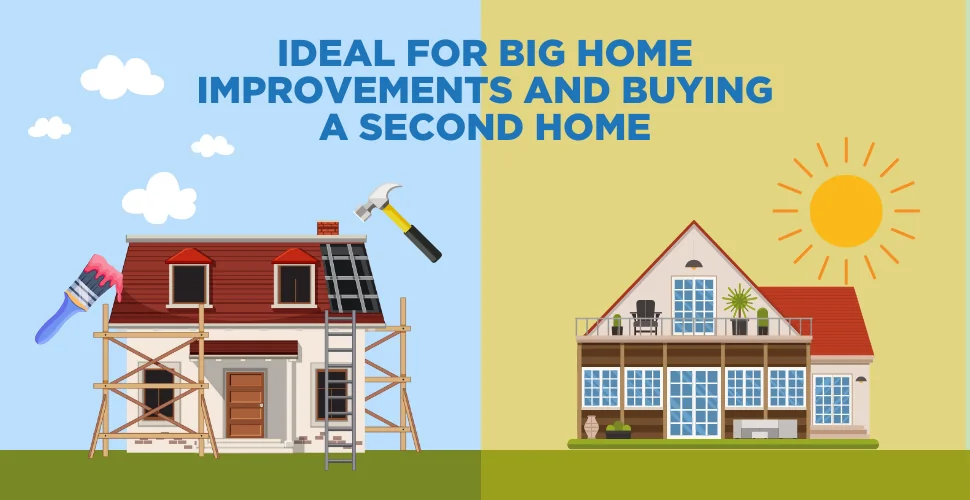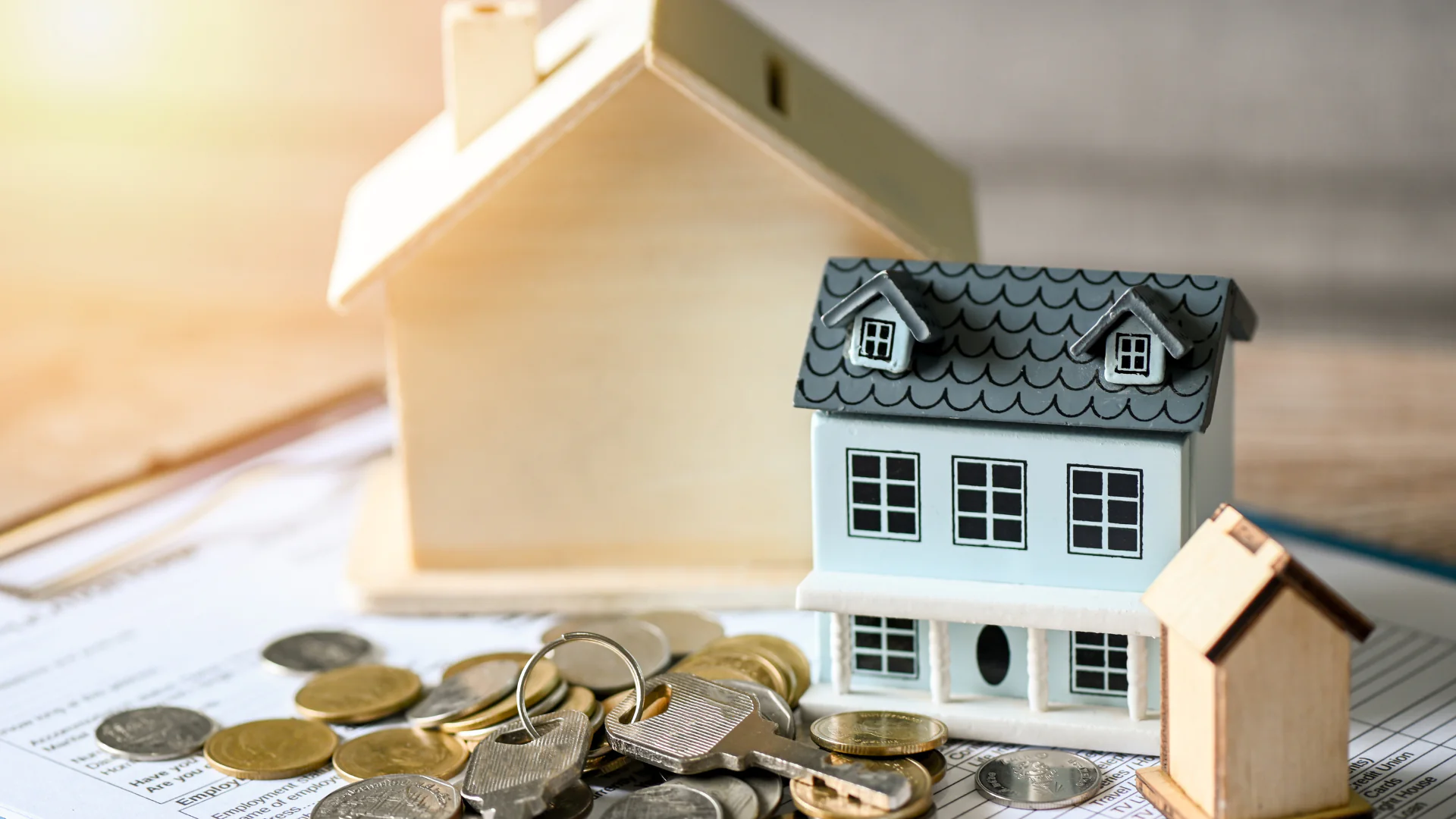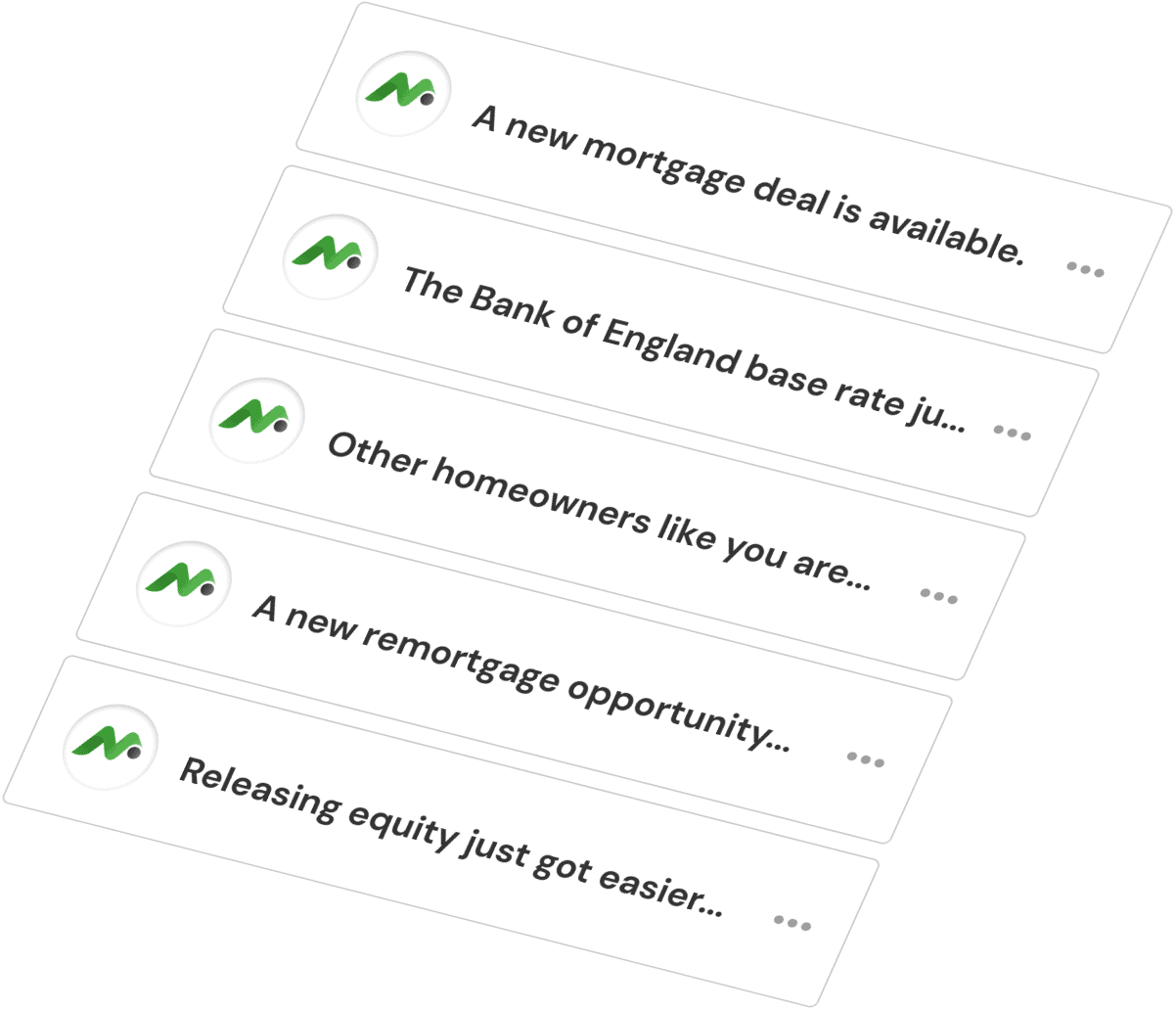What Exactly Is a Loan Against Property?
When you take out a loan against your property, you’re using your home as a security blanket for the lender. The loan is “secured” against your home’s value, offering the lender peace of mind.
If you can’t repay the loan, the lender has the right to sell your property to recoup their losses.
Moreover, secured loans like these offer you the benefit of lower interest rates and the flexibility to borrow larger amounts, even if your credit history is less than stellar.
However, the flip side is that you need to make your repayments on time, or you could lose your home.
How Does Borrowing Against Your Property Work?
To take out a loan against your home, you’ll need to have equity, which is essentially the share of the property you own.
Lenders use this equity to figure out the maximum amount you can borrow, usually up to a specific percentage of your home’s market value.
Your property’s worth acts as a safety net for the lender, and in return, you commit to regular monthly payments over a set period.
Failing to do so could lead to the lender repossessing your home to recover the debt.
When you apply, the lender checks your existing equity, income, and credit score to determine your loan amount and interest rate.
For instance, if your home is worth £250,000 with £100,000 left on the mortgage, you have £150,000 in equity. You could potentially borrow £50,000 for a project like a loft conversion, increasing your mortgage balance to £150,000.
Borrowing Against Your House: What You Need to Know
If you’re looking to borrow a large sum of money and pay it back over an extended period, a loan against your house might be the answer. But before diving in, it’s crucial to understand the features, uses, and risks involved.
Bigger Loan Amounts
Loans against your house let you borrow more money than unsecured loans. The amount you can borrow is directly related to the value or equity of your home. Simply put, the higher your home’s value, the more you can borrow.
Lower Interest Rates
Since your house serves as collateral, these loans are less risky for lenders. That’s why you often get lower interest rates. Plus, you’ll repay the loan over a longer period, which also helps keep the rates low.
Manageable Monthly Payments
You’ll make monthly payments that include both principal and interest, and these are often more manageable than what you’d find with personal loans. The terms are set upfront, so you’ll know exactly what you’re getting into.

Why Borrow Against Your Home?
Loans against your house are not something to take lightly, but they can be beneficial in specific situations:
Home Improvements
Home renovations not only enhance your living space but can also add value to your property.
Borrowing against your home can provide the significant funds needed for projects like kitchen upgrades, bathroom remodels, or room additions.
Business and Personal Expenses
If you require a hefty amount for personal or business needs, this type of loan could be your best bet.
Whether you’re purchasing a second home or investing in your business, the long repayment terms make it a more feasible option.
Credit Score Woes
If your credit history is making it hard for you to secure a loan, borrowing against your home may be an alternative.
Your home’s value provides a safety net for the lender, making it easier for you to qualify, even with bad credit.

Types of Loans Against Property
Thinking of borrowing against your home? You have several options:
> Secured Loans. These are your standard loans against property, taken out through a bank or lending institution.
> Second Mortgages. A separate loan that sits next to your first mortgage, enabling you to borrow more money based on your home’s equity.
> Remortgaging. Already have a mortgage? You could remortgage to increase your loan amount. But be cautious, as this is usually only a good option when your current mortgage deal is near its end.
Are You Eligible?
To successfully apply for a loan against property in the UK, you should:
- Be a Homeowner. Whether you own your home outright or partially, you need to have some level of ownership to be eligible.
- Meet Lender’s Criteria. This usually involves an assessment of your income, credit score, and other financial factors to make sure you can manage the repayments.
How Much Can You Borrow Against Your Home?
Figuring out how much you can borrow against your home boils down to two things: the equity you have and whether the lender believes you can handle the repayments.
For example, if your home’s value stands at £300,000 and you still owe £100,000 on the mortgage, you’ve got £200,000 in equity. With your lender’s approval, you could borrow up to a certain limit based on this equity.
Unlike unsecured loans, your home equity often enables you to borrow a larger sum, albeit with the need to pass affordability checks.
If you’re considering a secured loan, try to use the calculator below to get an idea of what your monthly repayments might be.
[Embedded Secured Loans Calculator]
While these figures provide an estimate, it’s wise to consult with a loan advisor who can help you grasp the full picture, inclusive of all potential fees and costs.
This way, you can make an informed decision that aligns well with your financial goals and circumstances.
Pros and Cons of Homeowner Loans
Understanding the pros and cons is critical before you decide to borrow against your home. Here’s a refined look at what to expect:
Pros
– Bigger Borrowing Capacity. Homeowner loans usually allow you to borrow a larger sum than unsecured personal loans.
– Credit Leniency. If a low credit score has been a barrier to securing a personal loan, a homeowner loan could offer a more accessible route.
– Lower Interest Rates. Homeowner loans often come with more competitive interest rates compared to unsecured loans.
– Extended Repayment Plans. You’ll often have the flexibility to repay the loan over a more extended period, making monthly payments more manageable.
Cons
– Risk of Home Loss. Failing to keep up with your repayments could result in losing your home.
– Longer Processing Time. Compared to personal loans, homeowner loans usually take longer to set up due to their more intricate nature.
– Potentially Higher Fees. The more complicated process may involve higher fees and additional charges.
– Accumulated Interest. Repaying the loan over a longer time frame can lead to higher total interest payments.
When Should You Consider a Homeowner Loan?
A homeowner loan is particularly useful when you need a larger amount than what an unsecured personal loan could offer, or when you want to pay it back over a longer term.
It’s often chosen for big home improvements or as a down payment on a second property or vacation home.
However, it’s crucial to consider the risks. If you can’t make the repayments, you’re putting your property on the line.

What Are Other Loan Options?
Credit Cards. These let you borrow money from a financial institution for immediate expenses. While the interest rates are generally higher, there are some 0% interest deals.
Unsecured Personal Loans. No need to use an asset as collateral, but these loans are often smaller and have higher interest rates.
Asset-Secured Loans Not Tied to Home. If you’re uneasy about using your home as collateral, you might use another valuable asset, like your car. However, you’ll probably be able to borrow less since the asset value is likely lower than that of your home.
Should You Take the Leap?
Deciding to borrow against your house is a big step. Here are some reasons you might consider it:
- You need a large amount for significant projects or purchases.
- You want the benefit of lower interest rates and longer repayment terms.
- You find it challenging to secure a loan due to a poor credit history.
However, remember that if you fail to make repayments, your home is at risk. Always consult with financial advisors to ensure you’re making a sound decision.
The Bottom Line
Getting a loan against your property can offer some great benefits like giving you access to large sums of money, lower interest rates, and more extended repayment periods. However, it’s crucial to remember that if you can’t make your payments, you could lose your home.
So, you should be confident in your ability to make timely payments every month, even if your circumstances change.
If you’re not sure how to navigate the loan landscape, consider seeking the guidance of a loan broker. A broker can help you find the best loan options for your specific needs and financial situation, making the entire process easier and less stressful.
If you’re thinking about taking this financial step and could use some expert advice, get in touch with us. We’ll link you with a reputable loan broker who can make this journey more straightforward for you.






